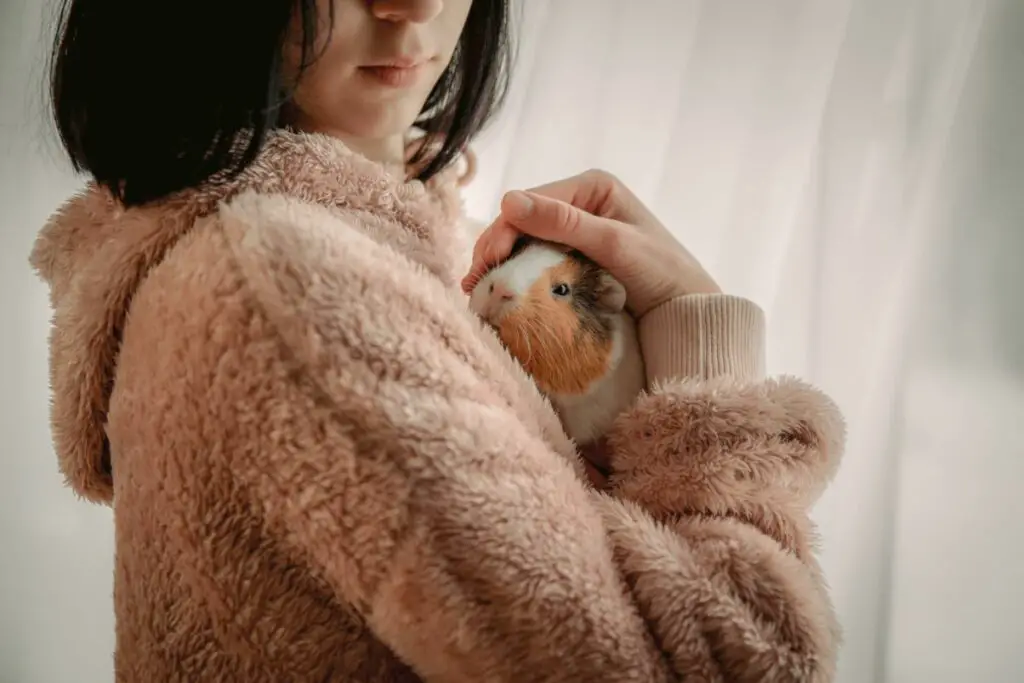If you’re considering adopting a guinea pig, one question you may have is whether or not they’re loud pets.
After all, nobody wants to be kept up all night by a noisy pet. In this ultimate guide, we’ll explore guinea pig vocalization, how loud they can get, and factors that can affect their noise level.
We’ll also provide tips for reducing noise if your guinea pig is particularly loud, and how to live harmoniously with your furry friend.

Understanding Guinea Pig Vocalization
Guinea pigs are social animals, and they use a variety of sounds to communicate with each other and their humans. Some common guinea pig sounds include:
- Wheeking: This is a high-pitched noise that guinea pigs make when they want food or attention. It’s often described as sounding like a squeaky toy or a bird chirping.
- Purring: Guinea pigs may purr when they’re content or relaxed. The sound is low-pitched and rhythmic.
- Chutting: This is a quick, staccato noise that guinea pigs make when they’re excited or happy. It’s often accompanied by hopping or running around.
- Teeth chattering: If a guinea pig is angry or scared, they may chatter their teeth together rapidly. This sound can be quite loud and alarming.
Compared to other animals, guinea pigs aren’t particularly loud. They’re certainly not as noisy as birds or dogs, for example. However, their high-pitched wheeking can be quite piercing, especially if they’re doing it repeatedly.
Factors that Affect Guinea Pig Noise Level
There are several factors that can affect how loud your guinea pig is. These include:
- Breed and genetics: Some guinea pig breeds are naturally noisier than others. Additionally, some individual guinea pigs may simply be more vocal than others.
- Gender: Male guinea pigs tend to be noisier than females, especially during breeding season.
- Age: Young guinea pigs may be more energetic and vocal than older ones.
- Environmental factors: If your guinea pig is stressed or uncomfortable, they may make more noise than usual. Additionally, if they’re in a noisy environment (e.g. a room with a loud TV), they may try to compete with the noise by being louder themselves.
- Health issues: If your guinea pig is in pain or discomfort, they may vocalize more than usual. Additionally, some health issues (such as respiratory problems) can make it difficult for guinea pigs to breathe, which can cause them to make more noise.
How Loud Are Guinea Pigs?
Decibels are a unit of measurement used to describe the intensity of sound. On average, a guinea pig’s wheeking can be around 70 decibels (dB).
To put that in perspective, a normal conversation is around 60 dB, while a vacuum cleaner is around 70-80 dB.
It’s important to note that not all guinea pig sounds are equally loud. For example, teeth chattering can be as loud as 90 dB, while purring is much quieter at around 30 dB.
Living with a Loud Guinea Pig
If you have a particularly loud guinea pig, there are a few things you can do to reduce the noise level:
- Choose the right living environment: If your guinea pig is in a noisy room, try moving them to a quieter one. Additionally, providing them with a cozy hideaway (such as a hut or tunnel) can help to muffle their sounds.
- Spend time with them: Guinea pigs are social animals, and they may make more noise if they’re lonely or bored. Spending time with your guinea pig each day can help to keep them content and quiet.
- Give them a friend. Guinea pigs are social animals that should always have a friend to keep them company. If you keep them alone, they might be making a lot of noise because they’re lonely.
Conclusion
All in all, guinea pigs are not particularly loud pets. While their high-pitched wheeking can be piercing, it’s not as loud as many other household noises.
If you’re considering getting a guinea pig, don’t let concerns about noise dissuade you! With proper care and attention, you can live harmoniously with your furry friend, even if they’re a little bit vocal.
- How Long Do American Eskimo Dogs Live? Important Factors and Care Tips - September 29, 2023
- Do American Bulldogs Need Grooming? Essential Tips and Care Guidelines - September 29, 2023
- Do Bengal Cats Enjoy Playing? Essential Tips for Keeping Them Active - September 29, 2023